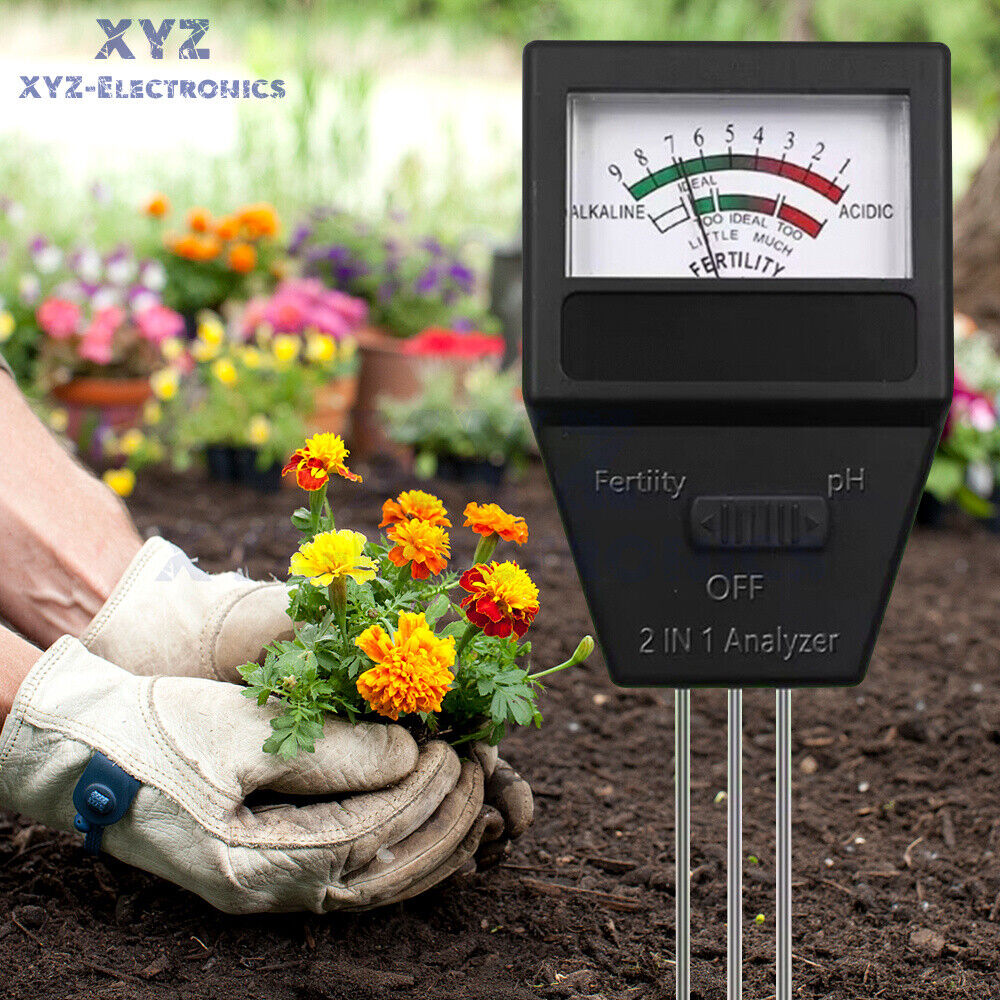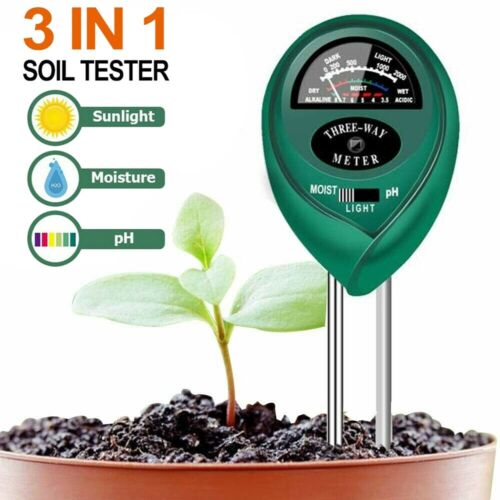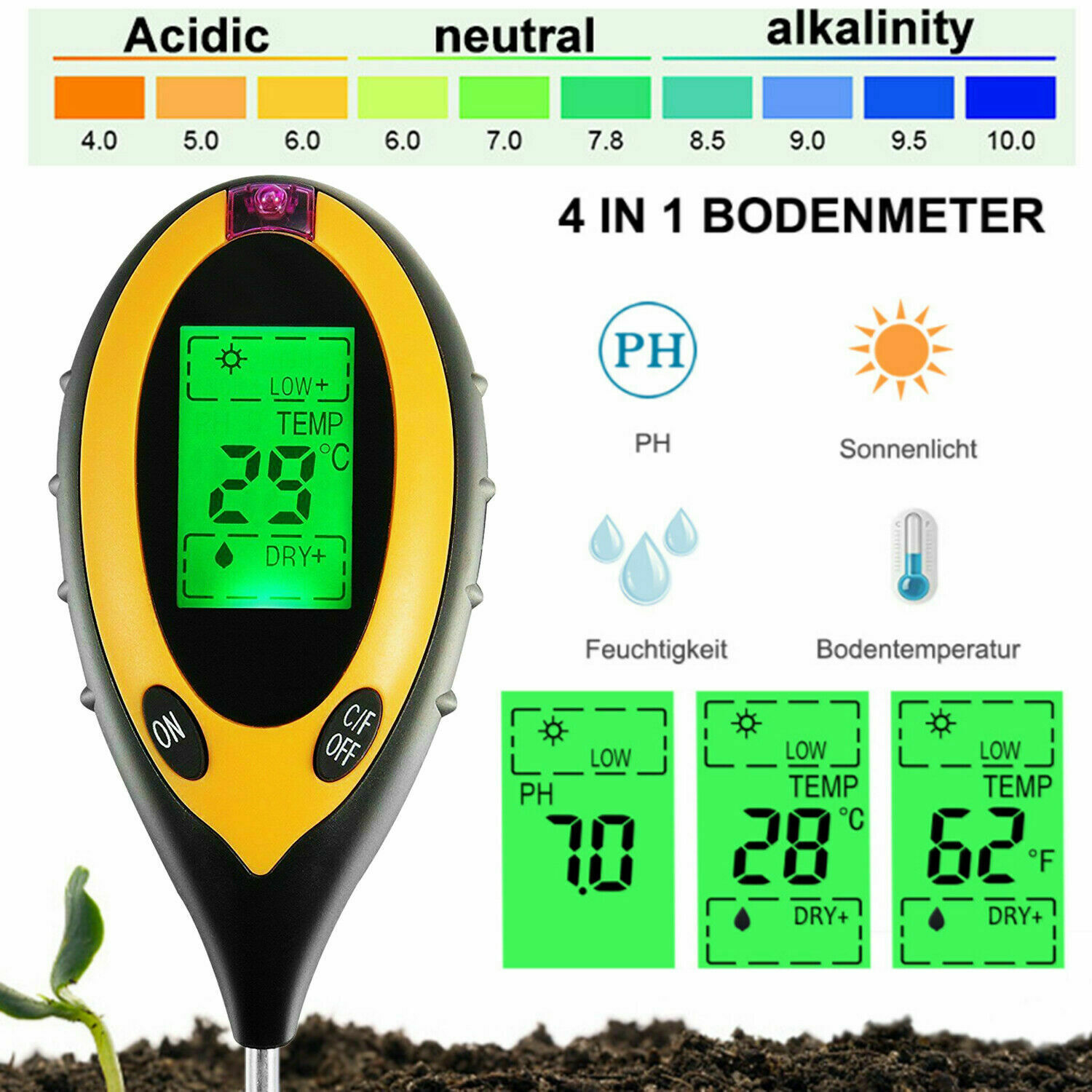-40%
2 in1 PH Tester Soil Water Acidity Meter Analyzer With 3 Probes For Garden
$ 4.17
- Description
- Size Guide
Description
Store CategoriesStore Categories
Other
2 in1 PH Tester Soil Water Acidity Meter Analyzer With 3 Probes For Garden
Details
Features
1. Environmentally friendly ABS material, fall and wear resistant.
2. Widely used: for outdoor and indoor plants, gardens and lawns.
3. Simple operation: easy to use, just plug in and read. No batteries, easy and convenient to use.
4. 2-in-1 function: test the soil pH of plants, quickly help you focus on mastering when you need to water and control the pH level in the soil.
5. Accurate and reliable: Advanced dual needle detection technology greatly improves the speed and accuracy of detecting and analyzing soil pH acidity.
Specification
Measuring range: PH: 0~9
Probe length: 8.6cm
Product size: 176*62mm
Material: plastic
Instructions for use
How to analyze soil fertility
1. First remove topsoil about 5 cm; then mash the soil down to 13 cm deep. And clean the soil of all organic impurities that will affect the test results, such as leaves, roots, etc.
2. Soak the soil with water to a muddy consistency. ( It is better to use rainwater or distilled water).
3. Wipe the probe with a clean cotton or paper towel.
4. Dial the function key to the first gear from the left, on.
5. Insert the probe rod into the measured soil until the distance between the soil and the body is no more than 2.5 cm. Wait for 10 seconds at most and wait for the pointer to stabilize before reading the data.
6. Record the data. Take the probe out of the soil and clean the probe thoroughly. The analysis results are judged by the following criteria
Lack of (TOO LITTLE)
Nitrogen less than 50 ppm
Phosphorus less than 4 ppm
Potassium less than 50 ppm
Ideal range (IDEAL)
50-200 ppm
4-14 ppm
50-200 ppm
Excess (TOO MUCH)
Greater than 200 ppm
Greater than 14 ppm
Greater than 200 ppm
Unit ppm: parts per million
If the analysis result shows "TOO MUCH" which means: too much
1. Water heavily to dilute the excess nutrients.
2. For potted plants, repot them into new soil.
3. Do not apply any more fertilizers, but add manure, compost, plant residues, leaves and other organic materials to the soil.
How to analyze the pH value of the soil
1. First remove the topsoil of the measured soil about 5 cm; then mash the soil down to a depth of 13 cm. And clean the soil of all organic impurities that will affect the test results, such as leaves, roots, etc.
2. Soak the soil with water to a muddy consistency. (It is better to use rainwater or distilled water)
3. Dial the function key to the rightmost gear, on.
4. Wet the probe rods. Use a clean cotton pad to put the rightmost of the three probes - . Root wipe clean.
5. Insert the probe completely into the soil under test.
6. Wait 1 minute for the data to be read.
7. After the test, wipe the probe clean and dry it.
Special Tips
Please do not insert the probe rod into the soil for a long time, and do not use this device to test the liquid to avoid damage to it.
List
1 x detector
Shipping Policy
Payment Method
Returns Policy
Shipping Policy
Payment Method
This is the description of Payment Method.
Do not dismiss your dream.
To be without dream is to be without hope.
To be without hope is to be without purpose.
Do not run through your life so fast that you forget not only where you have been, but also where you are
going.
Life is not race, but a journey to be savored each step of the way.
Returns Policy
This is the description of Returns Policy.
Do not dismiss your dream.
To be without dream is to be without hope.
To be without hope is to be without purpose.
Do not run through your life so fast that you forget not only where you have been, but also where you are
going.
Life is not race, but a journey to be savored each step of the way.
Copyright©2017 DataCaciques
Home
Payment
Return Policy
About us
Contact us
2 in1 PH Tester Soil Water Acidity Meter Analyzer With 3 Probes For Garden
Details
Features
1. Environmentally friendly ABS material, fall and wear resistant.
2. Widely used: for outdoor and indoor plants, gardens and lawns.
3. Simple operation: easy to use, just plug in and read. No batteries, easy and convenient to use.
4. 2-in-1 function: test the soil pH of plants, quickly help you focus on mastering when you need to water and control the pH level in the soil.
5. Accurate and reliable: Advanced dual needle detection technology greatly improves the speed and accuracy of detecting and analyzing soil pH acidity.
Specification
Measuring range: PH: 0~9
Probe length: 8.6cm
Product size: 176*62mm
Material: plastic
Instructions for use
How to analyze soil fertility
1. First remove topsoil about 5 cm; then mash the soil down to 13 cm deep. And clean the soil of all organic impurities that will affect the test results, such as leaves, roots, etc.
2. Soak the soil with water to a muddy consistency. ( It is better to use rainwater or distilled water).
3. Wipe the probe with a clean cotton or paper towel.
4. Dial the function key to the first gear from the left, on.
5. Insert the probe rod into the measured soil until the distance between the soil and the body is no more than 2.5 cm. Wait for 10 seconds at most and wait for the pointer to stabilize before reading the data.
6. Record the data. Take the probe out of the soil and clean the probe thoroughly. The analysis results are judged by the following criteria
Lack of (TOO LITTLE)
Nitrogen less than 50 ppm
Phosphorus less than 4 ppm
Potassium less than 50 ppm
Ideal range (IDEAL)
50-200 ppm
4-14 ppm
50-200 ppm
Excess (TOO MUCH)
Greater than 200 ppm
Greater than 14 ppm
Greater than 200 ppm
Unit ppm: parts per million
If the analysis result shows "TOO MUCH" which means: too much
1. Water heavily to dilute the excess nutrients.
2. For potted plants, repot them into new soil.
3. Do not apply any more fertilizers, but add manure, compost, plant residues, leaves and other organic materials to the soil.
How to analyze the pH value of the soil
1. First remove the topsoil of the measured soil about 5 cm; then mash the soil down to a depth of 13 cm. And clean the soil of all organic impurities that will affect the test results, such as leaves, roots, etc.
2. Soak the soil with water to a muddy consistency. (It is better to use rainwater or distilled water)
3. Dial the function key to the rightmost gear, on.
4. Wet the probe rods. Use a clean cotton pad to put the rightmost of the three probes - . Root wipe clean.
5. Insert the probe completely into the soil under test.
6. Wait 1 minute for the data to be read.
7. After the test, wipe the probe clean and dry it.
Special Tips
Please do not insert the probe rod into the soil for a long time, and do not use this device to test the liquid to avoid damage to it.
List
1 x detector
Shipping Policy
Payment Method
Returns Policy
Shipping Policy
1.We only ship to the confirmed address provided by eBay. please make sure your ebay address is 100% matches the address you would like us to ship to. If not, please let us know before we sent you the package, or we will not be responsible for any loss. hope you could understand.
2.Orders will be processed instantly and dispatched within 1-2 business days except hoilday, so we do NOT accept any email/message note after you place orders.
3.All package need to
wait 30 days
,
Please take care it.Less than 30 days,we can't take a refund
.
Payment Method
1.We accept PayPal payment ONLY, and must be received within 5 days from the date of purchase.
2. It is easy and safe for you to pay by credit cards, debit cards, bank transfers and PayPal account balances.
3.Buyers
are responsible
for import duties,custom fees and taxes, if any, please check your country.
Returns Policy
1.We believe our items are so outstanding. We are convinced you will be happy with your Purchase.
2. If you do not satisfy with our items. Please simply return to us within 30 Days in original condition. Just pay for the returned postage. Then we can issue full refund or resend the item to you after the returned item arrived at our warehouse.
3. Please include your eBay ID and item number with any email requests.
















